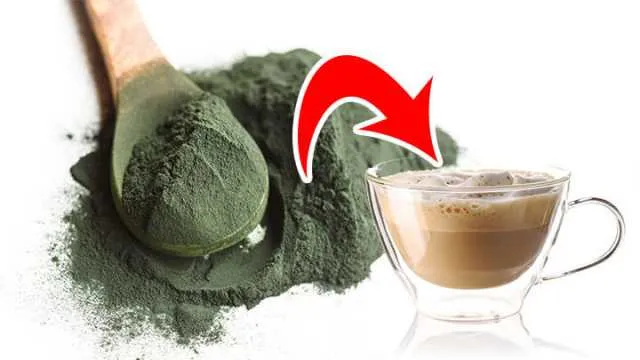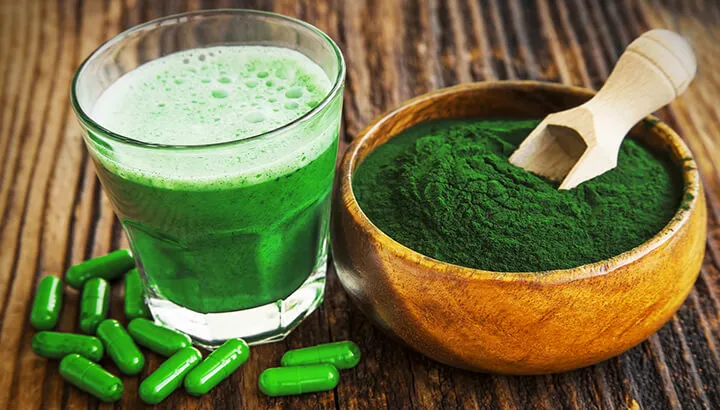
- Share on Facebook231
- Share on Pinterest
- Share on Twitter
Have you gone walking around recently and noticed someone carrying a frothy cup of blue-green something? Maybe you wondered what in the world it was, but were in too much of a rush to stop and ask. It was probably spirulina, a popular and super nutritious superfood that’s now making its way into beverages.
What is spirulina?
If you haven’t heard much about spirulina, it’s a blue-green algae that’s found in both fresh and salty water. This algae is actually a type of bacteria (cyanobacterium), and it’s a beneficial bacteria, indeed. In fact, spirulina is often referred to as the most nutrient-dense food on the planet.
On the benefits of spirulina, the authors of a 2013 article published in Mini Reviews in Medicinal Chemistry wrote:
“Spirulina has several pharmacological activities such as antimicrobial (including antiviral and antibacterial), anticancer, metalloprotective (prevention of heavy-metal poisoning against Cd, Pb, Fe, Hg), as well as immunostimulant and antioxidant effects due to its rich content of protein, polysaccharide, lipid, essential amino and fatty acids, dietary minerals and vitamins.” Sounds awesome, right?
How do you take it?

Spirulina can be found in capsules or in loose powder form. It is this loose powder form that can easily be added to smoothies and various recipes (try it in your next frittata). You can also take half a teaspoon to a teaspoon and mix it in with your latte. The following are twelve reasons to do just that:
1. Spirulina is teeming with antioxidants
These antioxidants can help to lower inflammation throughout your body. Chronic inflammation, left unchecked, may lead to a host of illnesses, including heart disease, cancer and autoimmune disorders, to name just a few. The main antioxidant compound in spirulina is known as phycocyanin. This antioxidant gives spirulina its strange, vibrant color.
2. It’s a great source of protein
In fact, it contains all of the essential amino acids that your body needs. While it shouldn’t be your only source of protein (gram for gram you need more than spirulina can offer), it’s a great way to make your beverage more filling. It can also help to give you energy.
3. It contains a wealth of vitamins and minerals
These include vitamin A, B-vitamins, vitamin C, vitamin E, calcium, copper, magnesium, manganese and potassium.
4. It contains lots of iron
Spirulina is a great choice for vegetarians and vegans because the amount of iron in this algae is high. It can help you meet your daily needs of this important mineral.
5. It contains essential omega-3 fatty acids
These are wonderful for the health of both your heart and your brain. Omega-3 fatty acids are also anti-inflammatory in nature. Most Americans don’t get enough of them, so their presence in spirulina is a huge bonus!
6. It fights inflammation
Spirulina contains anti-inflammatory gamma-linolenic acid (GLA), further boosting its inflammation-fighting capacity.
7. It can be a great help to your workout

It may help to boost both endurance and muscle strength, allowing you to get the most from your exercise session.
8. It detoxifies
The chlorophyll found in spirulina may help to detoxify heavy metals, such as arsenic, from your blood.
9. It alleviates allergies
Some research has found that taking spirulina on a daily basis can help to alleviate seasonal allergy symptoms. Great news for people who cough, sneeze and deal with watery eyes all spring or summer long!
10. It can lower your blood sugar

A 2001 study published in the Journal of Medicinal Food tested the effects of spirulina on 25 people diagnosed with type 2 diabetes. Researchers found that the spirulina supplementation significantly lowered blood sugar levels. On their results, the study authors wrote, “These findings suggest the beneficial effect of spirulina supplementation in controlling blood glucose levels and in improving the lipid profile of subjects with type 2 diabetes mellitus.”
11. It fights cholesterol
Spirulina may help to lower LDL cholesterol levels, that’s the “bad” type of cholesterol you don’t want in excess. Too much bad cholesterol can lead to clogged arteries, increasing your risk of heart disease. No, thank you!
12. It may help to protect against cancer
A 2014 study published in the Annals of Hepatology tested the effects of spirulina against pancreatic cancer in both in vitro human cells and in mice. On their results, the authors wrote, “In conclusion, S. platensis [spirulina] and its tetrapyrrolic components substantially decreased the proliferation of experimental pancreatic cancer. These data support a chemopreventive role of this edible alga.”
Those are some pretty amazing benefits from an unassuming blue-green algae!
Some quick notes of caution
Here a few things to keep in mind before you purchase spirulina:
- Be sure to choose organic spirulina. Spirulina that is not organic may have additives such as nitrates, and you don’t want those in your latte.
- While spirulina is rich in nutrients, it does not contain vitamin B12 in a form that is effective in humans. So, if you are vegan, keep in mind that you will still need to supplement your B12 even if you are taking spirulina.
- Do not take spirulina if you have PKU. Ask your doctor before you start this supplement if you have a medical condition, especially an autoimmune condition, take medication (especially a blood thinner), or are pregnant or nursing.
What’s your favorite way to enjoy the benefits of spirulina? Let us know!
– Tanya Mead
- Share on Facebook231
- Share on Pinterest
- Share on Twitter

